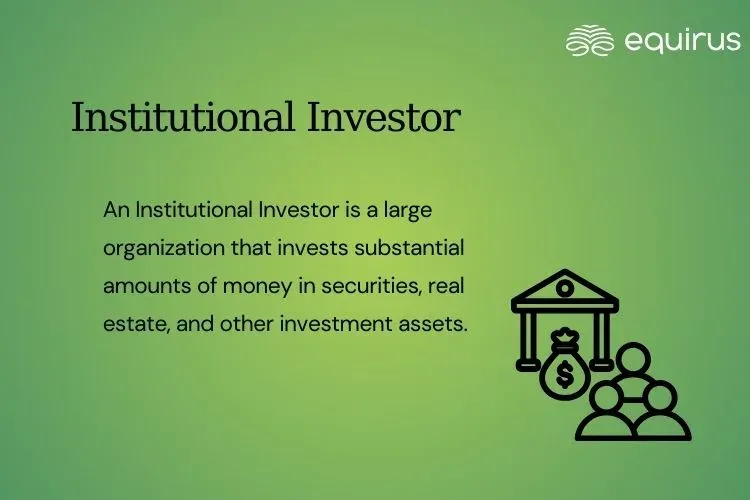Institutional Investor

Key Highlights
-
An Institutional Investor is a large organization that invests substantial amounts of money in securities, real estate, and other investment assets.
-
Common types of institutional investors include mutual funds, pension funds, insurance companies, sovereign wealth funds, endowments and foundations, hedge funds, banks and NBFCs.
What is Institutional Investor?
An Institutional Investor is a large organization that invests substantial amounts of money in securities, real estate, and other investment assets. These entities pool money from clients or members and invest it on their behalf with the goal of earning returns.
They are considered sophisticated investors, meaning they usually have greater access to information, lower trading costs, and more influence in financial markets than individual (retail) investors.
Examples of Institutional Investors
Common types of institutional investors include:
| Type | Description |
|---|---|
| Mutual Funds | Investment vehicles pooling money from retail investors to invest in securities |
| Pension Funds | Retirement funds that invest on behalf of employees |
| Insurance Companies | Invest premiums collected from policyholders |
| Sovereign Wealth Funds | State-owned funds investing in global assets |
| Endowments and Foundations | Non-profits that invest funds to support long-term goals |
| Hedge Funds | Pooled investment funds using complex strategies for high returns |
| Banks and NBFCs | Financial institutions that also invest in capital markets |
Key Characteristics
-
Large Capital Base: Manage large amounts of assets (often in crores or billions).
-
Professional Management: Employ skilled portfolio managers and analysts.
-
Long-Term Focus: Often have investment horizons stretching over years or decades.
-
Market Influence: Their trades can move markets due to the size of their investments.
-
Prefer Low-Risk Instruments: Many focus on bonds, blue-chip stocks, and diversified portfolios.
Why They Matter?
Institutional investors play a major role in financial markets by:
-
Providing liquidity through large-volume trades
-
Stabilizing markets with long-term investment strategies
-
Influencing corporate governance through shareholder voting
-
Setting valuation benchmarks based on their demand/supply actions
Indian Context
In India, major institutional investors include:
-
LIC (Life Insurance Corporation of India)
-
SBI Mutual Fund
-
EPFO (Employees' Provident Fund Organisation)
-
Foreign Institutional Investors (FIIs) and Domestic Institutional Investors (DIIs) play a significant role in stock market movements.
Institutional vs. Retail Investors
| Aspect | Institutional Investor | Retail Investor |
|---|---|---|
| Investment Size | Large-scale (crores to billions) | Small-scale (individual savings) |
| Access to Products | Complex instruments (private equity, derivatives) | Limited to publicly available assets |
| Resources | Teams of analysts and financial experts | Individual knowledge |
| Regulations | Subject to stricter regulatory requirements | Less regulated |
